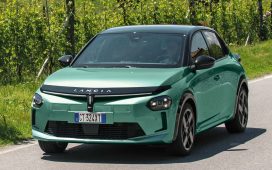A RECENT study revealed that nearly half of early American EV adopters are looking to pivot back to gas cars in their next new car purchase.
EV drivers pointed to three main problems with their current electric powertrains. Those problems are set to get a significant upgrade.
McKinsey Mobility Consumer Pulse conducted an international study of 37,000 drivers hoping to get a pulse on the adoption of electrified cars.
More than 46% of American EV owner-respondents said they were “very” likely to buy a gas-powered car for their next vehicle purchase.
Only Australia had more drivers switching back to gas.
More than 49% of Australian EV-respondents said they would move back to internal combustion.
On average, far fewer respondents said they are likely to go back to the gas station.
Only 29% of worldwide EV drivers said they would get out of an EV.
In Japan, only 13% of EV owners said they would switch back.
Globally, drivers had three main complaints about their electrified vehicles.
More than 30% of respondents said there wasn’t enough charging infrastructure, the total cost of the car was too high, and that it was too difficult to drive EVs long distance.
However, a new advancement in American infrastructure is likely to assuage public charging fears.
Last year, Tesla agreed to open up its Supercharger network to most other EV brands in the American market.
The Supercharger network is the largest chain of electric vehicle charging stations in the US.
Several car companies, including Ford and Rivian, have offered free charging adapters that allow their EV owners to plug into the station.
Other companies, like Honda, Toyota, Hyundai, and VW, will also hop on to the Tesla charging stations in either late 2024 or early 2025.
Customers have responded to hopefulness in the EV market.
Electric vehicles vs gas
Pros and cons of EVs vs gasoline-powered vehicles
EV PROS:
- Convenient (when charging at home)
- Cheaper (depending on state or city)
- Cheaper maintenance, due to lack of mechanical parts
- Great for commuting
- Reduced CO2 emissions
- Federal and state tax incentives
- More performance (speed, handling – depending on the make and model)
EV CONS:
- Higher initial cost
- Higher insurance rates
- More frequent tire and brake replacement intervals
- Higher curb weight (thus causing more rapid wear on crucial parts)
- Low resale value
- High depreciation rates
- Lack of charging infrastructure
- Unreliable public charging (related: slow charging times)
- Poor winter and summer performance
- Lack of clean energy alternatives means more “dirty energy” from coal and nuclear sources
- Range anxiety
GAS PROS:
- Highly developed refueling infrastructure
- Fast refueling
- Cheaper insurance rates, depending on make, model, and configuration
- Established repair industry
- Lower initial cost
- Higher range before refueling, especially with hybrids
- Many manufacturers produce nearly emission-less engines
- Cheaper refueling, depending on the location
GAS CONS:
- Finite resource (related: heavy dependence on petroleum)
- Carbon emissions/greenhouse gases
- Higher repair costs
- Higher insurance rates, depending on make, model, and configuration
- Varying costs at the pump, depending on state, city, and county
Source: Car & Driver, Perch Energy, AutoWeek
April 2024 saw a record number of EV registrations in the US after months of slumping sales.
Meanwhile, companies are doubling down on the electrified investments.
Hyundai executives called their upcoming Georgia EV plant the company’s “top priority.”
Meanwhile, VW and Rivian agreed to investments that could total up to $5 billion that could see a wealth of battery technology transferred between the two companies.











